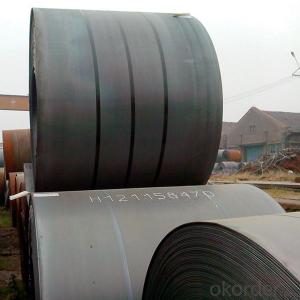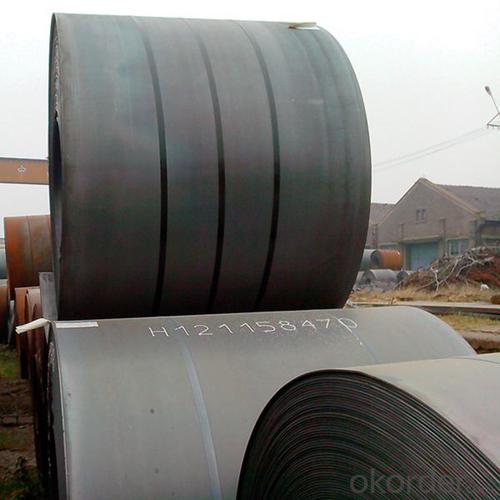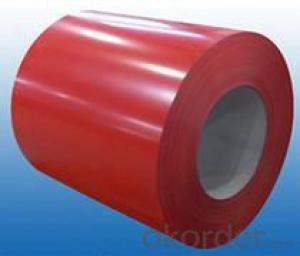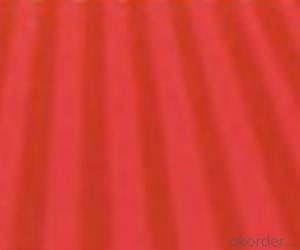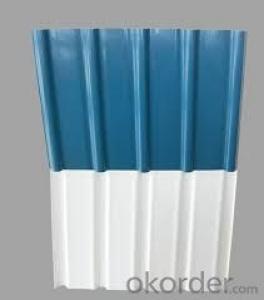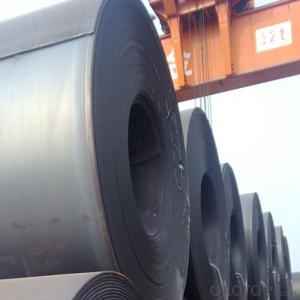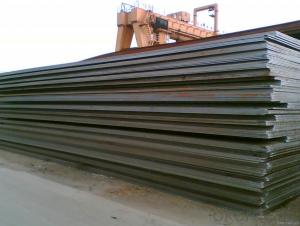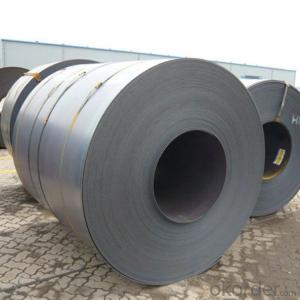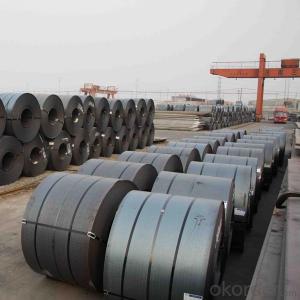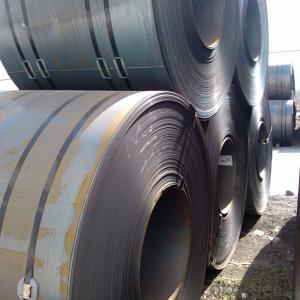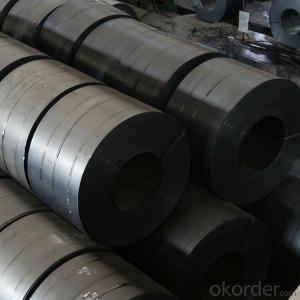Hot Rolled Steel Sheets JIS SS400 With Good Quality
- Loading Port:
- Tianjin
- Payment Terms:
- TT OR LC
- Min Order Qty:
- 28 m.t.
- Supply Capability:
- 100000 m.t./month
OKorder Service Pledge
OKorder Financial Service
You Might Also Like
Specification
DESCRIPTION:
1.Thickness: 1-200mm
2.Width: 100-3000mm
3.Length: 1000-12000mm
4. Applications :mining machinery, environmental protection, engineering
5. Grade:SS400 A 36 Q195.Q235.Q345.SPCC.SPCH
6.Surface : Hot Rolled Cold Rolled Galvanized Steel
FEATURES OF STEEL COILS
(1)Good ductility
(2)Good corrosion resistance
(3)Excellent abrasion resistance and fatigue strength
(4)Good weldability
(5)Oxidation resistant performance
(6)Excellent in high temperature
PACKING:
1.Big thickness:by bulk vessel
2.Small thickness:packed by steel strips and shipped by container
3.According to the requirements of customers'
TRADE TERMS :FOB, CFR, CIF
DETAILED PICTURES FOR STEEL COILS
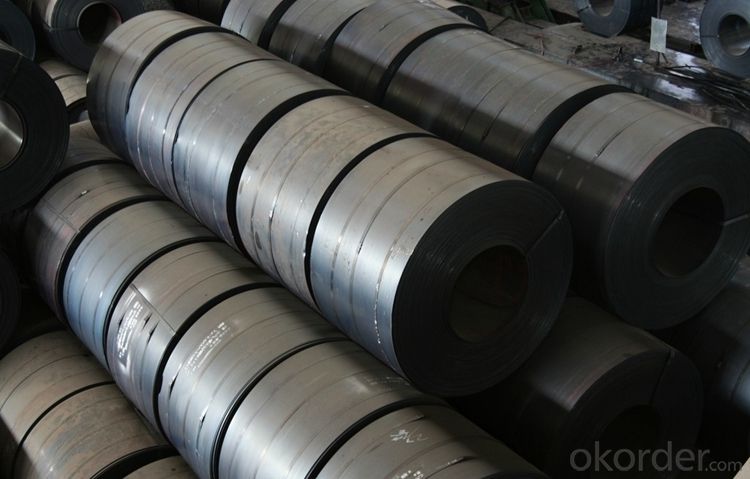
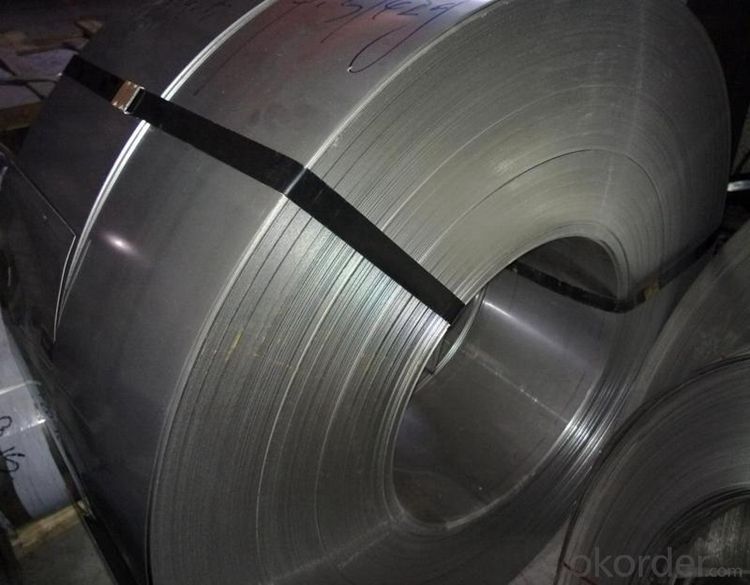
EXPORT MARKET FOR STEEL COILS/SHEETS
Our target market is the international market. Every year we export most of products to countries like India, Pakistan, South Korea, Brazil, Australia, South Africa, Spain, Sri Lanka, Taiwan, Hong Kong, etc.
OUR SERVICE
1.High quanlity and reasonable price.
2.Customized on-demand.
3.Reasonable shipping and fast delivery.
4.Free sample.
FAQ
Q:How to order?
A: Please send us your purchase order by email or fax .or you can ask us to send you a proforma invoice for your order .We need to know the following information for your order.
1) Shipping information-company name, street address, phone number, fax number, destination sea port
2) Product information – Quantity, Specification (steel type, thickness, width, surface finish)
3) Delivery time required
4) Forwarder's contact details if there's any in China
FAQ
Q:What are the advantages of your company ?
A: We have many professionals, technical personnel, more competitive prices and best after-dales service than other steel companies.
Q:Can you arrange the shipment ?
A: Sure we can help you with the shipment. We have forwarders who have cooperated with us for many years.
- Q: Can steel sheets be used in marine applications?
- Yes, steel sheets can be used in marine applications. Steel is a popular material choice for marine applications due to its high strength and durability. It can withstand the harsh conditions of saltwater and is resistant to corrosion. Steel sheets are often used in the construction of ships, offshore platforms, and other marine structures. They provide structural integrity and can be easily fabricated to meet specific design requirements. Additionally, steel sheets can be coated with protective layers, such as anti-corrosion paints or galvanization, to further enhance their resistance to corrosion in saltwater environments. Overall, steel sheets are a reliable and commonly used material in various marine applications.
- Q: What are the different sheet metal folding techniques for steel sheets?
- There are several sheet metal folding techniques for steel sheets, including the following: 1. V-Bending: This technique involves bending the sheet along a V-shaped groove. The sheet is placed between a punch and a die, and as the punch descends, it forces the sheet into the die, creating the desired bend. 2. Edge Bending: Also known as flanging, edge bending involves bending the edges of the sheet to form a flange. This technique is commonly used for joining two or more sheets together or creating a stiffening edge. 3. Box Folding: Box folding is used to create 3D shapes, such as boxes or enclosures. It involves folding the sheet along multiple bends to form a hollow structure. 4. Hemming: Hemming is a technique used to create a folded edge on the sheet, typically for aesthetic purposes or to provide additional strength. It involves folding the edge of the sheet back onto itself. 5. Roll Bending: Roll bending is a technique used to achieve curved bends in the sheet. The sheet is passed through a series of rollers, which gradually bend it to the desired curvature. These are just a few of the most commonly used sheet metal folding techniques for steel sheets. The choice of technique depends on the specific requirements of the project and the desired outcome.
- Q: Can steel sheets be customized in terms of thickness?
- Indeed, thickness customization is possible for steel sheets. Steel sheets are produced in a variety of thicknesses to accommodate diverse applications and demands. The manufacturing process allows for the customization of a steel sheet's thickness based on the customer's specific requirements. This customization feature provides versatility and adaptability, enabling steel sheets to be utilized across a broad spectrum of industries such as construction, automotive, manufacturing, and fabrication. By tailoring the thickness of steel sheets, they can effectively fulfill the precise needs for strength, durability, and structural integrity in any given project.
- Q: Can steel sheets be used in energy applications?
- Yes, steel sheets can be used in energy applications. Steel sheets are commonly used in the construction of power plants, wind turbines, and solar panels due to their high strength, durability, and resistance to extreme temperatures. They are also used in the manufacturing of energy-efficient appliances and energy storage systems.
- Q: How do you prevent rusting on steel sheets?
- To prevent rusting on steel sheets, there are various effective measures you can implement: 1. Implement Protective Coatings: Create a barrier between the steel surface and the surrounding environment by applying protective coatings like paint, enamel, or powder coating. These coatings act as shields that guard against moisture and oxygen, thus preventing rust formation. 2. Utilize Galvanization: Coat the steel sheets with a layer of zinc through the process of galvanization. Zinc is highly resistant to corrosion and serves as a sacrificial anode, safeguarding the steel underneath. This method is commonly employed for outdoor applications where steel is exposed to moisture and harsh weather conditions. 3. Ensure Proper Storage: It is vital to store steel sheets in a dry and well-ventilated area to prevent rust formation. Moisture and humidity play significant roles in rust development, so it is essential to keep the sheets away from damp or wet environments. Additionally, storing the sheets off the ground on pallets or racks can help avoid contact with moisture. 4. Practice Regular Cleaning and Maintenance: Consistently clean the steel sheets with mild detergent and water to eliminate dirt, debris, or corrosive substances that may lead to rusting. After cleaning, thoroughly dry the sheets to prevent moisture accumulation. 5. Employ VCI (Volatile Corrosion Inhibitor) Packaging: During storage or transportation, employ VCI packaging materials such as VCI paper or film to effectively prevent rust on steel sheets. VCI emits corrosion-inhibiting molecules that form a protective layer on the steel surface, thus preventing rust formation. 6. Avoid Water Contact: Steer clear of prolonged exposure of steel sheets to water or other corrosive liquids. If the sheets come into contact with water, it is essential to promptly and thoroughly dry them to prevent rusting. By adhering to these preventive measures, you can significantly mitigate the risk of rust formation on steel sheets, ensuring their long-term durability and performance.
- Q: What is the process of applying anti-corrosion treatments to steel sheets?
- The process of applying anti-corrosion treatments to steel sheets typically involves several steps. First, the steel sheets are thoroughly cleaned to remove any dirt, oil, or other contaminants that could affect the adhesion of the anti-corrosion coating. This is usually done through chemical cleaning or mechanical methods such as sandblasting. Once the surface is clean, a primer or pretreatment is applied to further enhance the adhesion of the anti-corrosion coating. This primer helps to create a protective barrier between the steel and the corrosive elements. The type of primer used may vary depending on the specific requirements and the type of anti-corrosion treatment being applied. After the primer has dried or cured, the actual anti-corrosion treatment is applied. This can be done through various methods such as spraying, dipping, or electroplating. The specific treatment used may vary depending on the desired level of corrosion resistance and the environmental conditions the steel sheets will be exposed to. Once the anti-corrosion treatment has been applied, the steel sheets are typically allowed to cure or dry according to the manufacturer's instructions. This ensures that the treatment fully adheres to the steel and provides maximum protection against corrosion. Overall, the process of applying anti-corrosion treatments to steel sheets involves cleaning, priming, applying the treatment, and allowing it to cure. This helps to significantly extend the lifespan of the steel sheets and protect them from the damaging effects of corrosion.
- Q: What are the standard sizes of steel sheets?
- The standard sizes of steel sheets vary, but some common dimensions include 4x8 feet, 4x10 feet, and 5x10 feet.
- Q: P355NL1 what kind of material is the steel plate?
- P355NL1 is the EU standard cryogenic quality grade steel.Its quality parameter is:Thickness 8-260mm;Tensile strength Rm630-450MPa;Yield strength: 355-295MPa;The elongation after fracture is 21-22%.
- Q: How do steel sheets compare to other types of metal sheets?
- Steel sheets are generally considered to be superior to other types of metal sheets due to their strength, durability, and versatility. They have a high tensile strength, making them resistant to bending and breaking. Steel sheets also offer excellent corrosion resistance, making them suitable for various applications, including construction, automotive, and manufacturing industries. Additionally, steel sheets can be easily fabricated and manipulated, allowing for a wide range of shapes and sizes. Overall, steel sheets are highly regarded for their exceptional performance and reliability compared to other metal sheets.
- Q: Are the steel sheets suitable for outdoor sculptures?
- Yes, steel sheets are suitable for outdoor sculptures. Steel has high durability, strength, and resistance to weathering, making it an ideal material for withstanding outdoor conditions. Additionally, steel can be easily manipulated and shaped, allowing for intricate and creative sculptures to be crafted.
Send your message to us
Hot Rolled Steel Sheets JIS SS400 With Good Quality
- Loading Port:
- Tianjin
- Payment Terms:
- TT OR LC
- Min Order Qty:
- 28 m.t.
- Supply Capability:
- 100000 m.t./month
OKorder Service Pledge
OKorder Financial Service
Similar products
Hot products
Hot Searches
Related keywords
